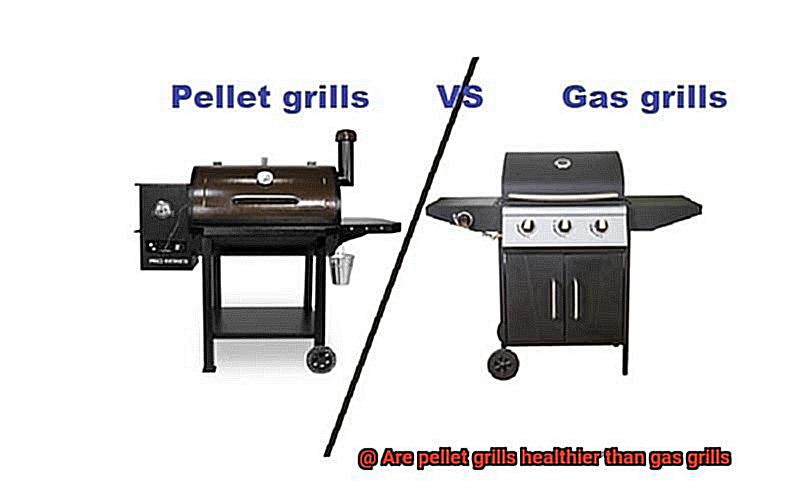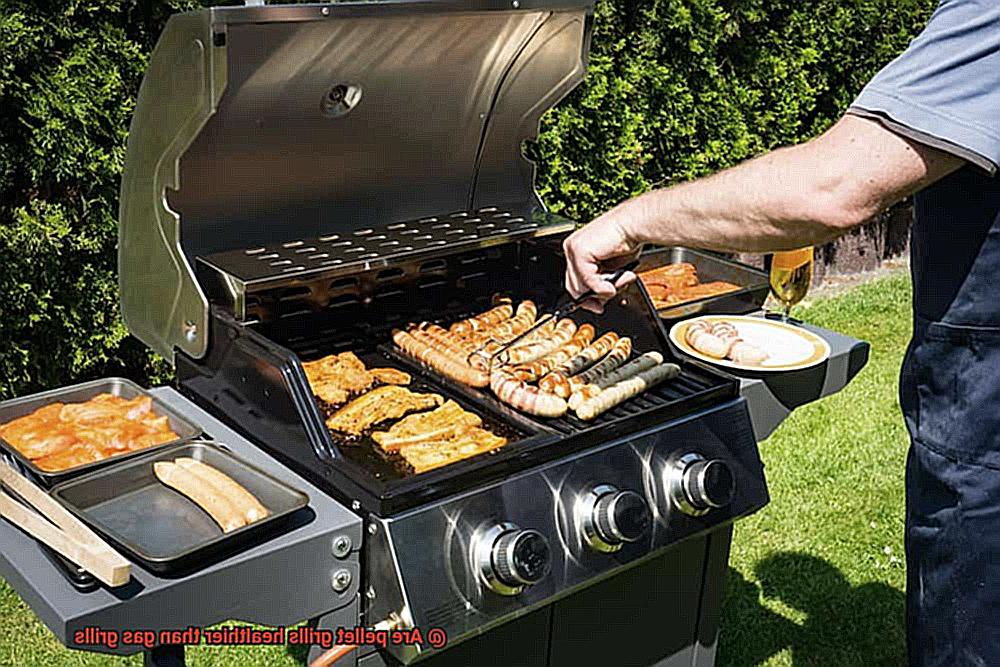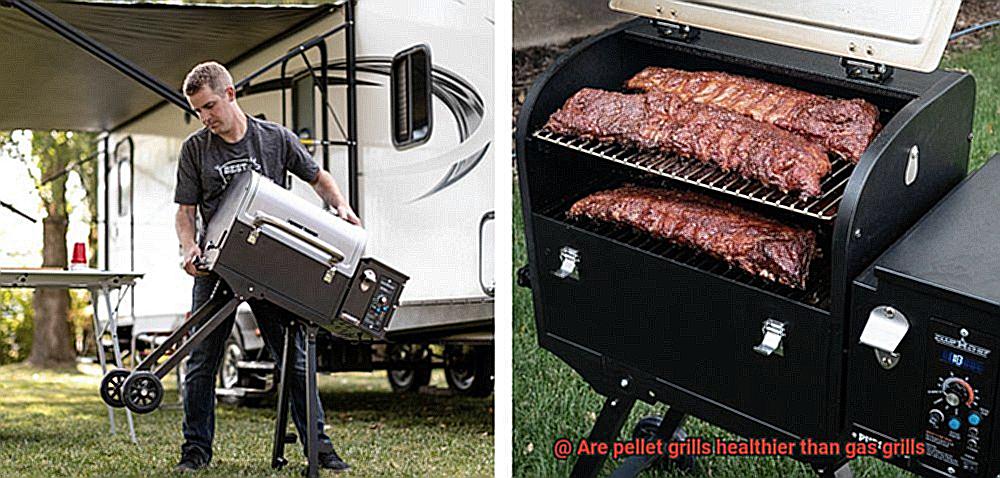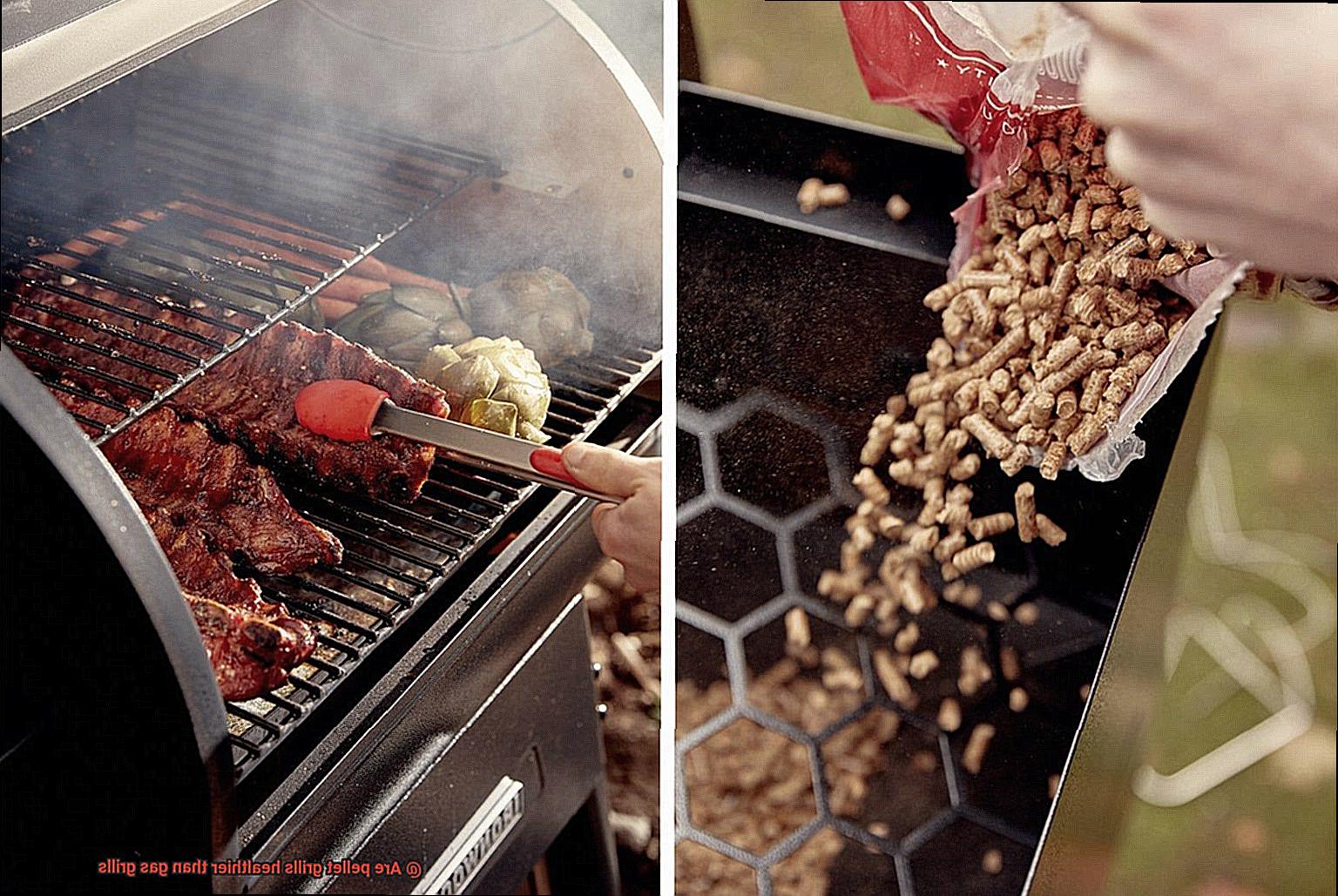Summer is almost here, and that means it’s time to fire up the grill and start cooking some delicious BBQ. But with so many options available, how do you decide between a pellet grill and a gas grill? One question that has been gaining attention in recent years is whether or not pellet grills are healthier than gas grills.
The answer isn’t as simple as choosing one over the other. Pellet grills use 100% pure hardwood pellets as fuel, which produce a unique smoky flavor that adds an authentic taste to your meat. Gas grills, on the other hand, burn propane or natural gas, which is cleaner and produces less smoke.

When it comes to evaluating the health benefits of each grill type, there are several factors to consider. These include the environmental impact of each fuel source, the nutritional value of the food cooked on each grill, and any potential health risks associated with cooking methods.
In this blog post, we’ll explore these differences between pellet grills and gas grills and help you make an informed decision about which option is best for your health and cooking style. So grab your apron and get ready to learn more about whether or not pellet grills are indeed healthier than gas grills.
Contents
What are Pellet Grills?
Pellet grills are the answer. These innovative devices use natural wood pellets as a fuel source, providing a consistent heat source that is easy to control. But that’s just the beginning – pellet grills are incredibly versatile and can be used for grilling, smoking, roasting, and even baking.
So how do pellet grills work? The wood pellets are fed into a hopper that delivers them to a burn pot through an auger. Once ignited, the burn pot produces smoke and heat that cook your food to perfection. And with a built-in digital thermostat, maintaining the desired temperature throughout the cooking process is a breeze.

Pellet grills come in various sizes and styles, from compact models perfect for small patios to commercial-grade units for larger gatherings. Plus, using natural wood pellets as a fuel source means less harmful chemicals and emissions than gas grills. Pellet grills also produce less ash and require less maintenance than traditional charcoal grills.
But perhaps the most exciting thing about pellet grills is the variety of healthy meals you can cook on them. From grilled vegetables to smoked salmon to baked potatoes, pellet grills offer endless possibilities for healthy outdoor cooking.
Benefits of Pellet Grills
Look no further than a pellet grill. These grills have been gaining popularity among grill enthusiasts due to their unique features and benefits.
One of the most significant advantages of pellet grills is that they use natural wood pellets as a fuel source instead of gas or charcoal. This results in healthier cooking, as there are no harmful chemicals or additives that can be released during the cooking process.
But the benefits of pellet grills don’t stop there. They also offer a more even and consistent heat distribution, which means that food is cooked evenly without hot spots or flare-ups that can often occur with gas grills. And with precise temperature control, you can cook delicate foods like fish and vegetables to perfection every time.
Pellet grills are incredibly versatile and can be used for a variety of cooking methods such as smoking, roasting, and baking. The wood pellets used in pellet grills come in a variety of flavors, such as hickory, applewood, and mesquite, which can add a unique and delicious flavor to your food. This versatility makes pellet grills an excellent investment for anyone who loves outdoor cooking and wants to experiment with different cooking techniques.
Drawbacks of Gas Grills
While they may seem like the perfect solution for outdoor cooking, it’s important to take a closer look at their drawbacks before firing them up. As an expert on the subject, I’m here to share with you some of the main issues associated with gas grills.
Let’s start with the most concerning issue – carbon monoxide. This toxic gas is produced when propane or natural gas is burned, which is exactly how gas grills work. In high concentrations, carbon monoxide can cause headaches, nausea, and even death. It’s essential to ensure proper ventilation when using a gas grill to prevent any build-up of this hazardous gas.
Another issue that can arise with gas grills is flare-ups. When fat or oil drips onto the flames, they can cause sudden bursts of fire that burn food and release harmful chemicals known as polycyclic aromatic hydrocarbons (PAHs) into the air. PAHs are carcinogenic and have been linked to various types of cancer. So not only are flare-ups annoying for cooking purposes, but they’re also harmful to our health.
Cleaning and maintenance are crucial when it comes to gas grills. If not cleaned properly, they can become a breeding ground for harmful bacteria such as E. coli and Salmonella. To prevent any potential health hazards, it’s important to regularly clean your grill after each use and deep clean it at least once a year.
Lastly, we need to address the environmental impact of gas grills. Burning fossil fuels produces greenhouse gases that contribute to climate change. As we all know, climate change has detrimental effects on human health and the environment.

Healthier Cooking with Pellet Grills
Pellet grills are the solution to your dilemma. These grills are gaining popularity among grill enthusiasts due to their convenience, versatility, and ease of use. Moreover, they offer a healthier cooking alternative that produces flavorful and nutritious meals.
One reason why pellet grills are considered healthier is because they use natural wood pellets as a fuel source. These pellets contain no harmful chemicals or additives that could contaminate your food. Additionally, they come in a variety of flavors that can add a unique smoky taste to your meals without the need for additional seasoning or marinades.

Pellet grills also utilize convection cooking, which circulates hot air around the food, ensuring even cooking and searing without exposing it to direct flames. This reduces the risk of flare-ups and charring, both of which have been linked to cancer-causing compounds.
Furthermore, pellet grills operate at lower temperatures than gas grills, which preserves the nutrients in your food and prevents the formation of harmful compounds resulting from high-temperature cooking. This makes them an ideal option for health-conscious individuals who want to enjoy delicious grilled meals without compromising their health.
Temperature Control and Indirect Heat
In this article, we’ll explore the importance of temperature control and indirect heat when determining the health benefits of pellet grills versus gas grills.
Temperature control is critical to achieving the perfect cook, and pellet grills excel in this area. They use natural wood pellets that burn at a lower temperature than gas, allowing for consistent heat over long periods. This makes them ideal for slow cooking and smoking meats, as well as for maintaining the perfect temperature to prevent carcinogenic compounds like PAHs and HCAs from forming. On the other hand, gas grills have a higher temperature range and are better suited for quick cooking. However, high temperatures can lead to harmful compounds in meat, making it important to monitor and regulate temperatures carefully.
Indirect heat is another crucial factor in healthy grilling, as it allows for even cooking without flare-ups that can create harmful smoke. Pellet grills are perfectly suited for this thanks to their ability to maintain a consistent temperature over long periods of time. Gas grills can also be used for indirect cooking, but hot spots and flare-ups can make it challenging to maintain consistent temperatures.
When it comes to choosing between pellet grills and gas grills for healthy grilling, pellet grills may have an edge in terms of temperature control and indirect heat. However, both types of grills can be used healthily with proper cooking techniques and precautions. It’s essential to monitor temperatures carefully, avoid flare-ups, and choose lean cuts of meat to minimize the formation of harmful compounds.
Versatility in Cooking Methods
When it comes to cooking, versatility is key. Pellet grills and gas grills are two popular options that offer a range of cooking methods to satisfy even the pickiest of palates.
Pellet grills are known for their ability to smoke, grill, and bake with ease. They maintain a consistent temperature throughout the cooking process thanks to the use of wood pellets that are fed into the grill through an automated system. With a variety of wood pellet flavors available, such as hickory, mesquite, and applewood, you can add a unique smoky taste to your food without needing additional wood chips or smoke boxes.
Gas grills have come a long way in recent years, now offering more than just grilling options. Some models come with infrared burners that provide intense heat for searing meat or fish, while others have side burners, rotisserie attachments, and smoker boxes to provide more cooking options. Plus, gas grills allow for precise temperature control through adjustable burners and knobs.
While both types of grills offer versatility in cooking methods, there are some key differences. Pellet grills excel at maintaining a consistent temperature, making them ideal for slow-cooking meats or smoking vegetables. Gas grills shine when it comes to quick cooking methods like searing or grilling.
Cleaner Burning Fuel Source
Pellets are made from compressed sawdust and wood shavings, making them a natural and renewable resource. In contrast, gas grills rely on non-renewable fossil fuels like propane or natural gas. By choosing pellets, you’re not only reducing your carbon footprint but also supporting a more sustainable future.
But the benefits of pellet grills don’t stop there. Pellets produce fewer harmful emissions than gas grills, including carbon monoxide, nitrogen oxides, and volatile organic compounds (VOCs). These pollutants can be dangerous to human health and contribute to air pollution. By choosing pellets, you’re opting for a healthier and safer grilling experience.
Gas grills also come with the risk of flare-ups and grease fires, which can be dangerous and even carcinogenic. Pellet grills have a more controlled temperature and produce fewer flare-ups, reducing the risk of these harmful compounds forming on your food.
In summary, here are the top reasons why pellet grills are the superior choice for anyone looking for a cleaner burning fuel source:
- Made from natural and renewable resources
- Produce fewer harmful emissions
- Provide a safer and more controlled grilling experience
EJqllBPDM18″ >
Conclusion
When it comes to the age-old question of whether pellet grills are healthier than gas grills, the answer isn’t cut and dry. Both types of grills have their pros and cons, and ultimately, the decision depends on your personal preferences and cooking style. However, after taking a closer look at various factors such as environmental impact, nutritional value of food cooked, and potential health risks associated with cooking methods, it’s clear that pellet grills offer several benefits over gas grills.
Pellet grills utilize natural wood pellets as fuel, which produces fewer harmful emissions than gas grills while adding a unique smoky flavor to your food. They also provide more even heat distribution and precise temperature control for healthy cooking. Furthermore, pellet grills offer versatility in cooking methods such as smoking, roasting, and baking.
In contrast, gas grills can lead to harmful compounds forming in meat due to high temperatures and flare-ups. They also require proper cleaning and maintenance to prevent bacterial growth.
All things considered, if you prioritize healthier cooking methods with a cleaner burning fuel source that produces flavorful meals with minimal risk of harmful compounds forming on your food, then a pellet grill may be the perfect choice for you.





